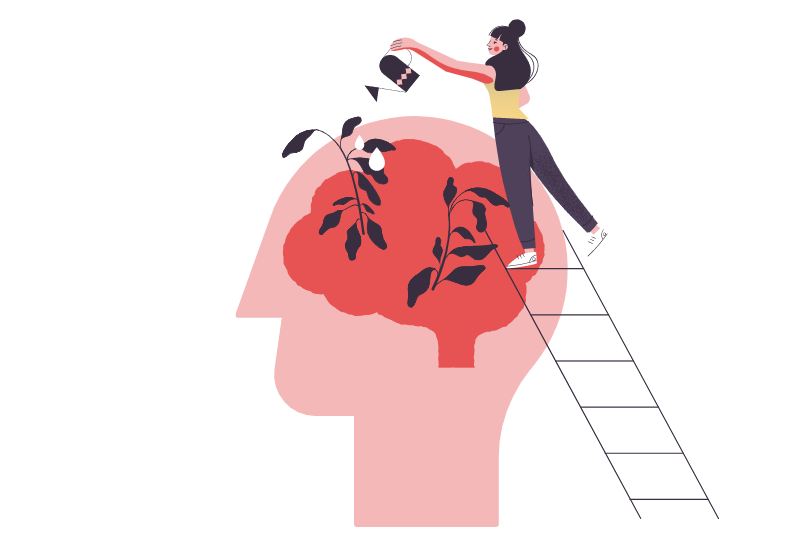We are excited to announce a collaboration between Palette Magz and EVOLVERE Mental Health! Each of our teams have written an article about mental health, aimed towards youth. Be sure to check out EVOLVERE’s side of the collaboration “It’s Time to Prioritize Your Mental Health“.
Mental health is an important asset in our life. Did you know that about 20% of Canadian youths have a mental disorder? Mental disorders can change your way of behaving and affecting your mood too. They are complicated and can take in many different forms.
Between 2008-2009 and 2018-2019 there has been a change of mental disorders for Canadian youth. There has been a 61% increase in visits to emergency departments and a 60% increase for hospitalizations in these past ten years. There has also been a 26% decrease in hospitalizations and other situations. The people who are ages 15 to 17 have the highest rate of hospitalizations and emergency department visits. Females aged 15 to 17 have twice the chance of being hospitalized than males the same age. In 2017 it was estimated that about 792 million people who have a mental disorder (10.7%). This shows that mental health disorders are common everywhere in every country.
Bullying can also affect our mental health immensely too. Bullying is a common issue that most kids experience. Studies have shown that bullies bully people because they have experienced emotional and physical abuse at home which is why their behavior towards someone is rude and insulting. Other studies show that a bully could have a personality disorder. There are all sorts of bullying like cyberbullying, physical bullying, social bullying and more.
Physical bullying is when bullies have power over the victim. This can cause serious injuries and if this happens, you should tell an adult immediately. Being physically bullied is more common in boys than girls.
Cyberbullying is bullying on the internet. This can include actions like rude text messages, emails, posts, images, videos, excluding others online and more. Cyberbullying is more common in girls. If you get hurtful messages don’t respond and block the person or tell an adult.
Social bullying is a way to hurt people emotionally on purpose. This includes things like telling rude jokes to humiliate someone, lying, spreading rumors that are not true, mimicking and so on. If you encounter these problems tell a trustworthy adult.
Bullying can have a great effect on a student’s health. These effects could include depression and effects on self esteem. Bullying can create problems in academics as well. A problem most students face when bullied is low performance in school participation and projects (school assignments or tests).
Here are some mental health disorders that people suffer from around the world:
Depression is a mood disorder in which you feel upset constantly. Some symptoms of depression are feeling helpless or hopeless, not able to focus properly, hard time sleeping, less self confidence, and more. 264 million people suffer from this disorder (3.4% of the global population). If you have these symptoms, you should contact a doctor or tell a parent.
Anxiety is a common mental illness. About 264 million people suffer from anxiety disorders. There are different types of it but the most common is the Generalized anxiety disorder. Symptoms of this are constant worry of several things, constant worry leads to headache, difficulties when trying to sleep and so on. This disorder is mostly common in adults and teenagers. There are other types of anxiety disorders like the panic disorder, Social anxiety, OCD (Obsessive-compulsive disorder), Post-traumatic stress disorder and more.
Bipolar is a disorder in which a person’s behavior can suddenly change. They can be happy and energetic but then suddenly turn sad and depressed. 0.6% of the world’s population has this disorder which makes it rare. Someone could get this disorder if one of your parents has it then it is most likely that you will get it too (does not mean it is guaranteed that you will). Therapy and mood stabilizing medication can help maintain Bipolar disorder. Avoiding caffeine can also help.
There are eating disorders as well like anorexia and bulimia. 16 million people experience this each year. Anorexia is a disorder where someone fears gaining weight and this causes weight loss. It is suggested that people who are diagnosed with this disorder should eat fruits (apples, oranges, kiwis and melons in particular), vegetables (especially mushrooms, tomatoes, spinach, cucumbers and radishes), Popcorn which is not buttered, protein shakes, Non-fat cottage cheese and Sugar-free popsicles. Bulimia is also an eating disorder where someone forcefully eats so much that they vomit. People with Bulimia are much like people that are diagnosed with anorexia, fearful of gaining weight. Therapy can help people who suffer with bulimia and anorexia.
Schizophrenia is another disorder in which people understand reality abnormally. It may result in a combination of hallucinations, delusions and chaotic ways of thinking. Around the world there are about 20 million people who have this disorder. Therapy such as psychotherapy, ECT (Electroconvulsive therapy) and family counseling can help people who suffer from it.
Awareness for mental health keeps growing each year. It is as important as physical health and it is important to discuss these issues because talking about it openly, can help us all understand how common mental health issues are. This can make us feel better about asking for help and feeling better once you have discussed it.
CITATIONS
“Child and youth mental health in Canada — Infographic”. 2020. Retrieved from Canadian Institute for Health Information. https://www.cihi.ca/en/child-and-youth-mental-health-in-canada-infographic
“Mental Health Series: The Effects of Bullying on Mental Health”. Retrieved from Ingle International. https://blog.ingleinternational.com/mental-health-series-the-effects-of-bullying-on-mental-health/
“Chapter 11: The Health of Canada’s Young People: a mental health focus – Bullying and Fighting”. March 16, 2012. Retrieved from Government of Canada. https://www.canada.ca/en/public-health/services/health-promotion/childhood-adolescence/publications/health-canada-young-people-mental-health-focus/bullying-fighting.html
Ritchie, Hannah. Roser, Max. “Mental Health”. April 2018. Retrieved from Our World in Data. https://ourworldindata.org/mental-health



